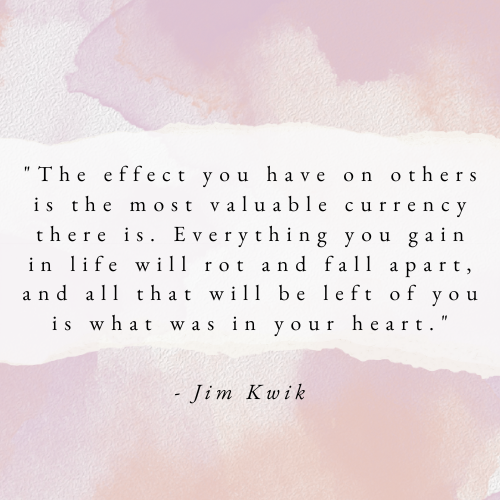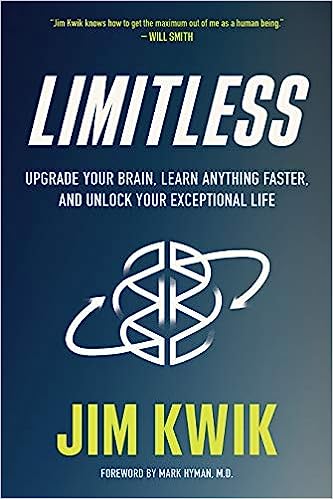Words of Wisdom from Limitless: Upgrade Your Brain, Learn Anything Faster, and Unlock Your Exceptional Life by Jim Kwik

After sustaining a brain injury as a child and struggling with learning for years, Jim Kwik became determined to overcome his learning challenges by training his brain.
This book is Jim’s account of how he achieved this. Limitless is packed with Jim’s personally tried and tested techniques to enhance learning, speed reading, memory recall, focus and more, In addition to these techniques, Jim uses the “3 M’s”: Mindset, Motivation, and Methods to highlight the potential that lies within everyone, and that we really are all “limitless”. This book will change the way you think, and should be essential reading for everyone. Here’s a taste of the bits that resonated for me…
1. Think carefully about who you take advice from
“Don’t take criticism from someone you wouldn’t take advice from.”
2. Our brain is incredible
“Our most precious gift is our brain. It is what allows us to learn, love, think, create, and even to experience joy. It is the gateway to our emotions, to our capacity for deeply experiencing life, to our ability to have lasting intimacy. It allows us to innovate, grow, and accomplish.”
3. Let go of perfectionism
“Perfectionism reduces creativity and innovation.”
4. There is no such thing as failure
“There is no such thing as failure. Only failure to learn.”
5. Our mindset is every thing
“If our mindset is not aligned with our desires or goals, we will never achieve them.”
6. You have to do what others won’t to live an exceptional life
“When you do what others won’t, you can live how others can’t.”
7. Learn how to learn
“Give a person an idea, and you enrich their day. Teach a person how to learn, and they can enrich their entire life.”
8. Find your ‘why’
“If you’re struggling to find motivation to learn, or to accomplish anything else in your life, there is a good chance you haven’t uncovered the why of the task.”
9. How to remember things
“To remember any new piece of information, you must associate it with something you already know.”
10. What effect will you have on others?
“The purpose of my life had always been to free people from concern. . . . How will you serve the world? What do they need that your talent can provide? That’s all you have to figure out. . . . The effect you have on others is the most valuable currency there is. Everything you gain in life will rot and fall apart, and all that will be left of you is what was in your heart.”
11. We are responsible for who we become
“Our background and circumstances may have influenced who we are, but we must be accountable for who we become.”
12. You can train your memory
“It’s not accurate that your memory works like a container, cup, or hard drive in that once it’s full of data no more can fit. It’s more like a muscle in that the more you train it, the stronger it gets and the more you can store.”
13. Favour creation over consumption
“The human brain does not learn as much by consumption as it does by creation.”
14. Time is precious
“Your time is one of your greatest assets. It’s the one thing you can’t get back.”
15. Protect your time and energy
“A big part of self-love is being protective of your time and energy. Setting boundaries around your time, emotions, mental health, and space is incredibly vital at any time, but especially when you don’t sleep. When you lack any necessary fuel, such as sleep or food, your resources aren’t as abundant as they are at other times, so protecting what you have becomes very important.”
16. Don’t look to others for validation
“It’s not your job to like, love, or respect me. It’s mine.”
17. Regret is worse than fear
“Here’s the truth: Creating the life you want can be scary. But you know what’s scarier? Regret.”
18. The past doesn’t determine what you’re capable of now
“Just because I haven’t always been good at this in the past doesn’t mean that I can’t be great at it now.”
19. Use “I am” more often
“I am.” Whatever you put after those two words determines your destiny.”
20. Use pain as a tool
“Pain can be your teacher, if you use it and not let it use you. Use pain to drive you to make things happen.”
21. Do one thing at a time
“Whenever possible, try to do one thing at a time.”
22. Struggle leads to strength
“Often our greatest struggles lead to our greatest strengths.”
23. Create a Not-To-Do List
“Create a Not-to-Do List This one might seem counterintuitive, but sometimes it’s just as important to know what not to do as what to do. This tactic is used best for directing your attention to the essentials and avoiding what doesn’t matter in the moment. Often at the beginning of a project, or even just a packed day, it can feel overwhelming to decide what to concentrate on. The power of the not-to-do list is that you decide from the very beginning what you will definitely put aside.”
24. Being present will improve your memory
“Most of the time, when we fail to remember something, the issue isn’t retention but rather attention. If you’re serious about boosting your memory, condition yourself to be truly present in any situation where you want to remember something.”
25. Read
“Leaders are readers.”
26. Share your knowledge and skills
“Purpose, however, is about how you relate to other people. Purpose is what you’re here to share with the world. It’s how you use your passion. When you get down to it, we all have the same purpose: to help other people through our passion. The greatest task we have in life is to share the knowledge and skills we accumulate.”
27. Don’t underestimate the power of learning
“if knowledge is power, then learning is our superpower.”
28. Eat nutritious food
“While our brains take up very little of our total body weight, they use 20 percent of the energy we take in, so nutrients make a huge difference in the way our brains function on a day-to-day basis.”
29. Use technology as a tool
“Like fire, technology has changed the course of human history. However, fire can cook your food or burn your home down—it’s all in how you use it. Like any tool, technology itself isn’t good or bad, but we must consciously control how it’s used. If we don’t, then who becomes the tool? It’s up to you to choose how you engage.”
30. What are you really saying “no” to when you say “yes” to something?
“Most of us feel tired and fatigued these days. I believe that’s because we feel like we need to say “yes” to every opportunity, invite, or request that comes our way. While it’s great to be open-minded and consider options, when you say yes to something, you need to be careful that you’re not inadvertently saying no to yourself and your own needs.”

